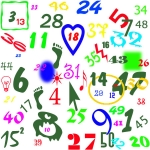Logical Thinking Test

For adults and very smart children.
The test consists of 30 items. Each item has the form:
- A. Condition
- B. First consequence
- C. The second consequence
- D. The third consequence
" Condition" is the condition of the task, some circumstances that are previously considered somehow proven and always true.
"Consequence" is a logical consequence of the condition. Of the three consequences, one and only one is correct. Your task is to test your ability to separate the correct logical consequences from the wrong ones.
The test does not require special mathematical knowledge. All the words in the test should be interpreted as it is done in the ordinary everyday Russian language, but not in the same way as in mathematics or some other special field. All words in the test should be interpreted literally, no metaphors or hints in the test is provided.
In the test, you can find unfamiliar words, such as "kuzdra." These words are intended to assess your ability to think logically, separating it from your other knowledge about the world around you. Consider that these words can mean anything, but so that the phrase in the condition is truthful in meaning. For example, if it says that "kuzdra runs", this means that the cusp actually does run and apparently has legs or feet, it could be for example a person, an animal or a walking machine 
Sometimes in the test, words and expressions of opposite meaning are encountered, for example, "they are able" and "do not know how", "big" and "small", etc. In all such cases, it is assumed that intermediate variants ("can, but bad", "average") are not considered.
26-30 points:
You have a well developed logical thinking. If you make mistakes in reasoning, then mostly by accident or fatigue, but not because of inability. Nevertheless, remember that all good things can always be improved - if, of course, you need it.
20-25 points:
You have a well developed logical thinking. However, you can make mistakes in non-standard or confusing cases. Having obtained some conclusion as a result of reasoning, do not rush to take it for truth. Take for a rule to recheck your conclusions, look for mistakes in them and just weaknesses. Do not be surprised, do not be indignant if you are corrected: perhaps for the cause.
14-19 points:
Option 1.
You did not have the patience to go through the whole test, you did it only partially, and the remaining items were chosen at random.
Option 2.
Your logical thinking is undeveloped. If you try to publicly argue, then, quite possibly, you will be ridiculed. You have to turn to other strengths of your personality, if you want to convince someone or something to find out something. However, maybe you are not completely hopeless if you try to learn.
6-13 points:
Option 1.
You passed the test, poking at random.
Option 2.
You have no logical thinking at all. The result that you got, you can get a simple poking at random. Do not try to "reason logically", especially in public. You can be mistaken for a madman.
3-5 points:
You did not want to pass the test.
1-2 points:
You have a well developed logical thinking. If you make mistakes in reasoning, then mostly by accident or fatigue, but not because of inability. Nevertheless, remember that all good things can always be improved - if, of course, you need it. In this case, you decided to cheer yourself up and answer the questions deliberately wrong.


Comments
When commenting on, remember that the content and tone of your message can hurt the feelings of real people, show respect and tolerance to your interlocutors even if you do not share their opinion, your behavior in the conditions of freedom of expression and anonymity provided by the Internet, changes Not only virtual, but also the real world. All comments are hidden from the index, spam is controlled.